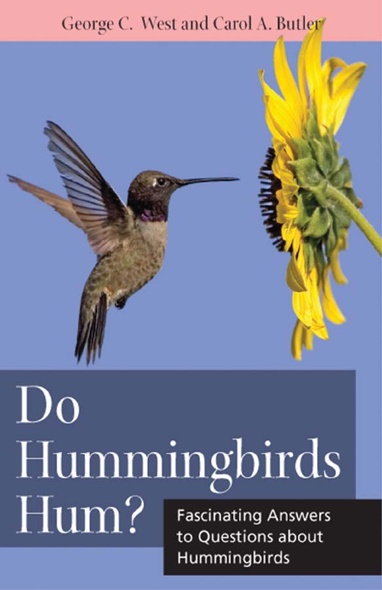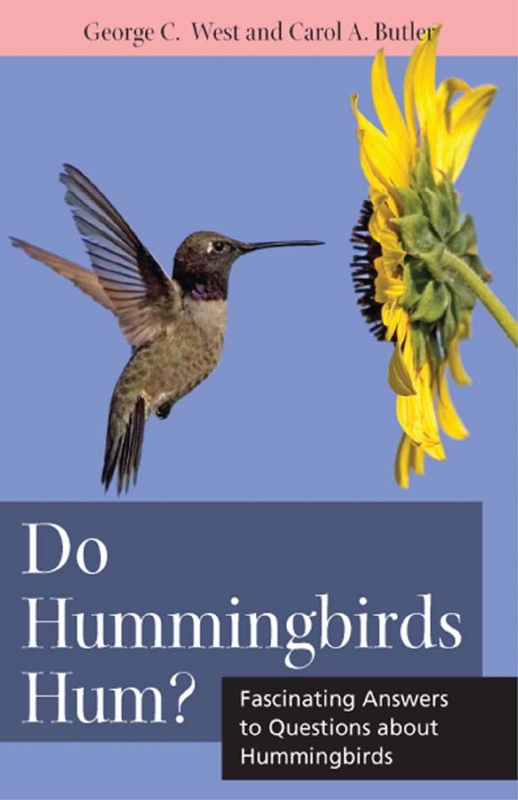Our shopping cart is currently down. To place an order, please contact our distributor, UTP Distribution, directly at utpbooks@utpress.utoronto.ca.
Do Hummingbirds Hum?
Fascinating Answers to Questions about Hummingbirds
By George C West and Carol A Butler
SERIES:
Animals Q & A
Rutgers University Press
Hummingbirds may be the smallest birds in the world, but they have the biggest appetites. Their wings flutter on average fifty to eighty times each second as they visit hundreds of flowers over the course of a day to sip the sweet nectar that sustains them. Their hearts beat nearly twelve hundred times a minute and their rapid breathing allows these amazing birds to sustain their unique manner of flight. They can hover in the air for prolonged periods, fly backwards using forceful wings that swivel at the shoulder, and dive at nearly two hundred miles per hour. Native only to the Americas, some hummingbirds have been known to migrate from Mexico to Alaska in the course of a season. Watching a hummingbird at a backyard feeder, we only see its glittering iridescent plumage and its long, narrow beak; its rapidly moving wings are a blur to our eyes.
These tiny, colorful birds have long fascinated birders, amateur naturalists, and gardeners. But, do they really hum?
In Do Hummingbirds Hum? George C. West, who has studied and banded over 13,500 hummingbirds in Arizona, and Carol A. Butler provide an overview of hummingbird biology for the general reader, and more detailed discussions of their morphology and behavior for those who want to fly beyond the basics. Enriched with beautiful and rare photography, including a section in vivid color, this engaging question and answer guide offers readers a wide range of information about these glorious pollinators as well as tips for attracting, photographing, and observing hummingbirds in the wild or in captivity.
These tiny, colorful birds have long fascinated birders, amateur naturalists, and gardeners. But, do they really hum?
In Do Hummingbirds Hum? George C. West, who has studied and banded over 13,500 hummingbirds in Arizona, and Carol A. Butler provide an overview of hummingbird biology for the general reader, and more detailed discussions of their morphology and behavior for those who want to fly beyond the basics. Enriched with beautiful and rare photography, including a section in vivid color, this engaging question and answer guide offers readers a wide range of information about these glorious pollinators as well as tips for attracting, photographing, and observing hummingbirds in the wild or in captivity.
West and Butler's book is a very refreshing change of pace on a variety of subjects regarding the hummingbird. It is a delight to find such a comprehensive and concise treatment of the most commonly asked questions regarding the lives of these tiny little beasts.
Do Hummingbirds Hum? is a well-organized and nicely researched book that will be a wonderful addition to any hummingbirder's library.
An interesting compendium of knowledge about these marvelous little birds. This volume contains a wealth of information concerning hummingbird biology from the seemingly trivial facts to somewhat complex considerations. Highly recommended.
This volume excels in compiling research on this interesting avian lineage and presents the material in an accessible and enjoyable manner.
GEORGE C. WEST is a professor emeritus of zoophysiology at the University of Alaska, Fairbanks, and a researcher in the physiology and ecology of birds. He has published more than one hundred scientific papers, provided hundreds of illustrations for others, and recently published the revised and updated
A Birder's Guide to Alaska.
CAROL A. BUTLER is the coauthor of Salt Marshes: A Natural and Unnatural History (Rutgers University Press), Do Butterflies Bite? Fascinating Answers to Questions about Butterflies and Moths, Do Bats Drink Blood? Fascinating Answers to Questions about Bats, and Why Do Bees Buzz? Fascinating Answers to Questions about Bees.
A Birder's Guide to Alaska.
CAROL A. BUTLER is the coauthor of Salt Marshes: A Natural and Unnatural History (Rutgers University Press), Do Butterflies Bite? Fascinating Answers to Questions about Butterflies and Moths, Do Bats Drink Blood? Fascinating Answers to Questions about Bats, and Why Do Bees Buzz? Fascinating Answers to Questions about Bees.
Preface
Acknowledgments
One. Hummingbird Basics
Two. Systems and Senses
Three. Feathers and Bones
Four. Reproduction
Five. Flight and Migration
Six. Dangers and Defenses
Seven. Attracting and Feeding
Eight. Identifying and Photographing
Nine. Research and Conservation
Appendices
References
Index
Acknowledgments
One. Hummingbird Basics
Two. Systems and Senses
Three. Feathers and Bones
Four. Reproduction
Five. Flight and Migration
Six. Dangers and Defenses
Seven. Attracting and Feeding
Eight. Identifying and Photographing
Nine. Research and Conservation
Appendices
References
Index





